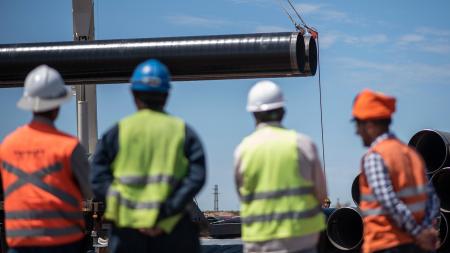The violent practices of beatings or abuses are within “gender parameters” legitimized by society, like “the famous pancakes that are made in schools, which later transfers to the field of work in adulthood,” he said anthropologist Hernán Palermo, Conicet researcherconsulted after an operator who had just entered the company Tenarisin the province of Neuquén, denounced sexual abuse by their co-workers in a “rite of passage”.
Consulted by Télam, Palermo, PhD in Anthropology, researcher at the Center for Labor Studies and Research (CEIL-CONICET) and author of the book “The production of masculinity in oil work”reflected on the fact denounced by the Tenaris operator, a situation investigated by the provincial Justice, which prompted the company to lay off eight workers.

-Palermo, do items still assigned to men and not to women?
–Jobs characterized as “masculine” can be performed by women. For example, women can be miners, there are no biological impediments, but there is a historical and social construction that assigns certain jobs to one gender and not to another. This society was formed in the binary, where the man is subject to resistance, strength, virility and the woman to the delicate. But I wonder, what happens when we enter an area exclusively for men where practices associated with virility are legitimized?
In the world of oil there is an exaltation of the attributes of masculinity. As in any field of work, professional technical knowledge is evaluated, but what is also evaluated are practices linked to masculinity, almost as if it were one more tool. Resistance to blows, making cuts invisible, or not stopping work because “it’s not a school for young ladies” are elements of how to behave as a man based on those production requirements and standards. If a worker cuts himself, he continues working, and this is read in terms of masculinity, this is in harmony with business interests.
If you ask a supervisor he will say that he gives a task and the worker has to finish it “rain or shine or snow”. So, in the performance evaluations, practices linked to the exercise of masculinity are considered, where we realize a chain of responsibilities that deepen this construction.
-The prosecutor of the case mentioned that the “rites” are a common practice. Are they typical of masculinities?
-They are rites of “manliness”. Since I was a boy, the famous blankets are made in schools. Endure the blows to show that you are up to the task. This then carries over to the realm of work in adulthood. In this case from Neuquén, lJustice will analyze the situation and determine what to do with the workers who perpetrated this abusebut what we cannot say is that they are “crazy”, “sick”, “animals”, but that it is the most rationally human within the social parameters of gender, that is, what we are seeing here is a tremendous situation, but it is a consequence of how practices are legitimized in the field of work.
There are still actors who legitimize this, that is, businessmen, unions, the workers themselves. But the exacerbation of masculinity is not exclusive of oil workers, it is part of our society. There is no irrationality in this act, but it is shocking to say that this is part of the construction of society, of how we produce and how we train men.
-These practices also occur in sports, or as we learned last year, in the Army…
-Anthropologist and feminist activist Rita Segato has stated that in our society there is a range of options for exercising male violencebut when a rape between men occurs, society as a whole is horrified and says “that is crazy”, but that violence has a DNA of all other violence.
-Those who dare to denounce, are they people who are already beginning to feel that the discourses and practices of masculinity must be deconstructed?
-I think so. We must be encouraged to denounce this and make it visible. I am convinced that many workers upon entering have suffered these acts of violence. It is a chain of legitimacy in the community of men, the one who was a victim later is a victimizer. Those who enter because they are younger and have to pay the floor fee must be “converted” and “made full-fledged men” with these initiation rites. Once you endured that situation you are already the “macho who is the bank”.
If you don’t submit to the rites You betray the code of masculinity. That is why it is important to work on violence and masculinities. That companies and unions invite reflection and debate. The situation is complex, it is not easy because it is naturalized. The male is tied to an endless mandate of manhood and it is frustrating to live with it. But I am optimistic and I believe in the new generations. Once we understand that it is a social demand of how we should behave, living is easier.


















